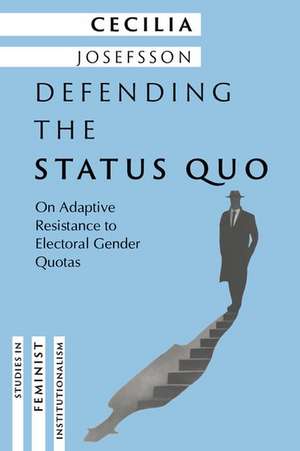Defending the Status Quo: On Adaptive Resistance to Electoral Gender Quotas: Studies in Feminist Institutionalism
Autor Cecilia Josefssonen Limba Engleză Hardback – 13 ian 2025
Preț: 401.11 lei
Preț vechi: 553.13 lei
-27% Nou
Puncte Express: 602
Preț estimativ în valută:
76.78€ • 83.42$ • 64.53£
76.78€ • 83.42$ • 64.53£
Carte disponibilă
Livrare economică 20-26 martie
Preluare comenzi: 021 569.72.76
Specificații
ISBN-13: 9780197788592
ISBN-10: 0197788599
Pagini: 280
Dimensiuni: 152 x 226 x 31 mm
Greutate: 0.5 kg
Editura: Oxford University Press
Colecția OUP USA
Seria Studies in Feminist Institutionalism
Locul publicării:New York, United States
ISBN-10: 0197788599
Pagini: 280
Dimensiuni: 152 x 226 x 31 mm
Greutate: 0.5 kg
Editura: Oxford University Press
Colecția OUP USA
Seria Studies in Feminist Institutionalism
Locul publicării:New York, United States
Recenzii
Gender quotas are widely adopted but also widely subverted as policy reforms around the globe. In Defending the Status Quo, Cecilia Josefsson presents an original and compelling theoretical account of the evolving nature of resistance to gender quotas, as status quo defenders find new and often effective ways to block or undermine quotas as they move through various stages of the reform process. Relevant to scholars, advocates, and policymakers, the volume is destined to become a classic reference for understanding - and developing tools to overcome - resistance and backlash against gender equality.
Notă biografică
Cecilia Josefsson is an Associate Professor in the Department of Government at Uppsala University, Sweden. Her research focuses on political institutions and representation from a gender perspective. She received her PhD from the Department of Government at Uppsala University in 2020. Her dissertation "Adaptive Resistance: Power Struggles over Gender Quotas in Uruguay" was awarded the European Consortium for Political Research (ECPR) Joni Lovenduski PhD Prize in Gender and Politics in 2023. Currently, she is researching gendered working conditions and leadership in parliament, resistance to gender-equitable institutional change, and political representation in times of crisis.

